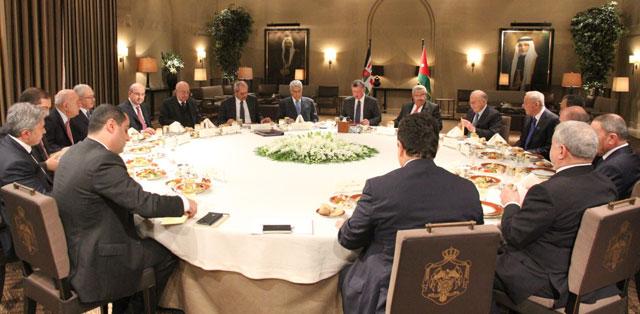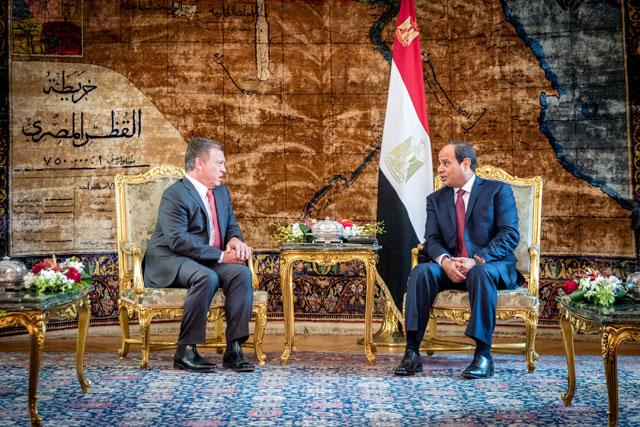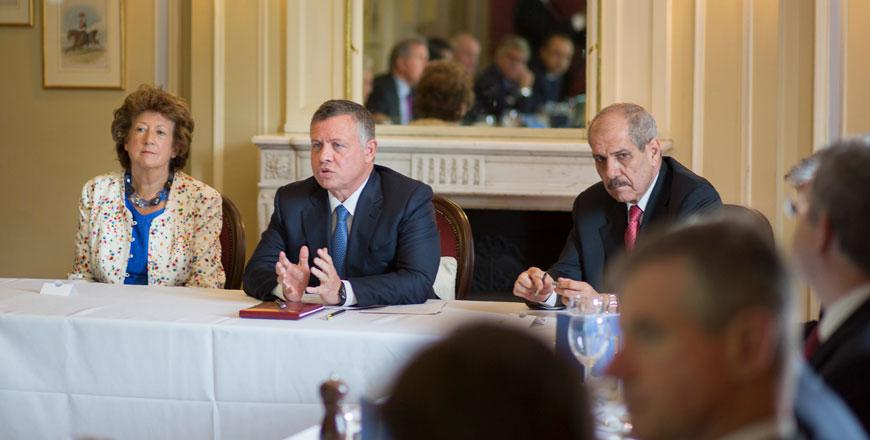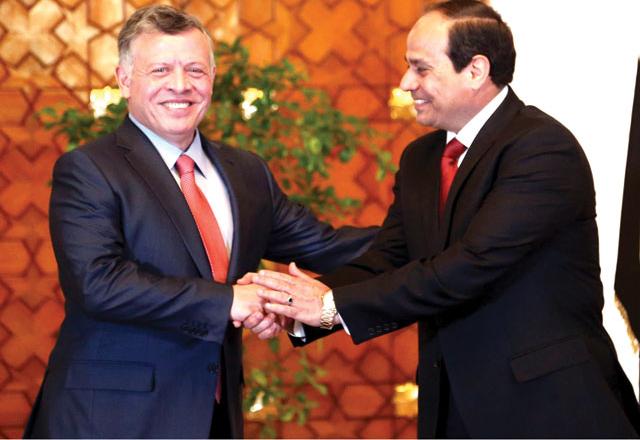You are here
King meets with former premiers over regional, local challenges
By JT - Dec 21,2014 - Last updated at Dec 21,2014

AMMAN — His Majesty King Abdullah met on Sunday with former prime ministers with whom he exchanged views on regional and international developments, and several national issues.
The meeting, which was held at Al Husseiniya Palace, came in line with the King’s ongoing efforts to keep in close contact with leading figures of the Jordanian community, a Royal Court statement said.
The King outlined Jordan’s efforts as part of the international coalition combating terrorism and terrorist groups, noting that the war against terrorism is a war within Islam in the first degree.
As such, Arab and Muslim countries must adopt a comprehensive, strategic and a collaborative approach in confronting terrorism and terrorist groups, the King told the former officials.
King Abdullah said the war against terrorism and radical ideologies is a military war in the short run, a security war in the medium term and an ideological war in the long run.
Overcoming this danger will help Arab and Muslim people turn around to dealing with other challenges facing them, foremost of which is the Palestinian issue and the Palestinian people’s right to establish their independent state on their national soil, the King said, according to the statement.
King Abdullah stressed the importance of building an Arab-Islamic coalition against terrorism, reiterating that the war against the terrorist groups is an Arab and Islamic affair, because the groups with extremist ideologies will not stop at Syria and Iraq if they gained more power, but will work to extend their grip to other Arab and Islamist countries, and worldwide.
His Majesty noted that combating this danger requires an intellectual approach, based on Islam’s values of tolerance and moderation, highlighting the role Al Azhar Al Sharif can play as well as the role of the various Jordanian initiatives launched to serve this purpose.
The King pointed out that radicalism is not confined to a certain religion, per se, noting that there is extremism in various communities and among followers of different religions, citing extremism in Israel. This makes it inevitable that all the powers of goodness in the world cooperate in confronting this danger, the King told the attendees.
With regard to Jordan’s ability to deal with regional challenges, the King noted that Jordan is in a strong position, thanks to the highly prepared Jordan Armed Forces-Arab Army and security bodies and their ability to confront all dangers with competence and professionalism.
Regarding the crisis in Syria, the King emphasised Jordan’s support of a political solution to the crisis that safeguards the unity of Syria and ends the suffering of its people which has been going on for years. The King also asserted Jordan’s support for Iraq’s security and stability.
Regarding the dangers of terrorist groups in Syria and Iraq, the King pinpointed the need to support the tribes that are engaging terrorist groups in both countries.
The Monarch stressed the centrality of the Palestinian issue, noting that arriving at a just and a comprehensive solution to the Palestinian issue will facilitate solutions to various regional challenges.
He noted that the Palestinians and the Israelis should work together to arrive at a solution for the Middle East conflict, which, he said, requires support from the international community to ensure the resumption of peace negotiations and solutions to final status issues.
Domestically, the King noted that improving economic conditions, and dealing with the problems of poverty and unemployment top the Kingdom’s priorities, stressing the importance of joining all efforts to improve living conditions and to create new job opportunities for young Jordanians.
For their part, the former premiers attributed the success in Jordan’s efforts to address challenges to the consistent and effective policies of the Hashemite leadership, while noting that the professionalism of the army and the security services is an asset as the Kingdom stands up to face terrorism.
They also highlighted the role of the Egypt-based Al Azhar, the top Sunni authority in the world, in clarifying the true image of Islam.
The statesmen warned against Israeli policies that hinder peace efforts and jeopardise the holy sites in East Jerusalem.
On domestic issues, they presented their views on key pieces of legislation and called for solution to the unemployment problem, which, they said, leads to social and familial disturbance. They also called for revamping the education and higher education sectors, and addressing red tape in public administration, among other internal challenges.
Attendees included Mudar Badran, Zeid Rifai, Ahmad Obeidat, Taher Masri, Abdul Karim Kabariti, Ali Abul Ragheb, Feisal Al Fayez, Adnan Badran, Marouf Bakhit, Samir Rifai and Awn Khasawneh.
Prime Minister Abdullah Ensour attended the meeting, along with Senate President Abdur-Ra’uf S. Rawabdeh, Royal Court Chief Fayez Tarawneh — both former prime ministers — and King’s Office Director Jafar Hassan.
Related Articles
AMMAN — His Majesty King Abdullah on Wednesday returned home following a brief visit to Egypt during which he met with the Egyptian Presiden
AMMAN — His Majesty King Abdullah met on Thursday with leading political, intellectual and academic figures in London with whom he went over
His Majesty King Abdullah on Thursday held talks in Cairo with Egyptian President Abdel Fattah Al Sisi that focused on means to strengthen Jordanian-Egyptian relations and addressed the regional latest developments.

















